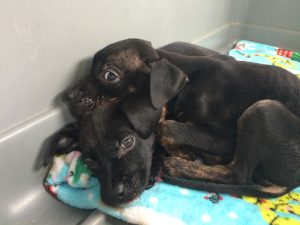The dreaded phone call came at noon on a Monday some weeks ago. A puppy had tested positive for parvovirus at the animal shelter. Staff and volunteers went into high gear to figure out how to save this puppy and her brother. And, importantly, to prevent the spread of the virus to the other dogs at the shelter.
Parvovirus is highly contagious to unvaccinated canines and it is deadly. It causes lethargy, vomiting and diarrhea and in puppies is almost always fatal if not treated immediately. Tracking one small drop of feces on the bottom of a shoe from an infected puppy to an unvaccinated dog could prove fatal. The puppies were immediately transferred to a veterinary hospital where they could be monitored and treated 24/7. Every place the puppies had been at the shelter was triple cleaned with a powerful viricide. Thankfully, no other shelter dogs became sick and the two puppies recovered.
The person who brought the puppies to the shelter was contacted and advised to take all of her dogs to a veterinarian immediately. In addition, siblings to the sick puppies had been given away to other families and those people needed to be contacted to let them know to take their puppy immediately to a veterinarian. It is not known if any other dogs were sick, but the likelihood is high that they were.
Treating a dog with parvovirus is expensive. The veterinary hospital quoted $800-$1900 per puppy depending on how long they had to stay at the hospital and what supportive care was required. No drug is available to cure parvovirus. Treatment is intense supportive care – iv fluids, antiemetics, and antibiotics.
Watching a puppy suffer with parvovirus is heartbreaking. And so unnecessary. There is a vaccine that is very effective against parvovirus and it is not expensive, approximately $20 at low-cost clinics or just $5 at the Brown County Humane Society’s annual Rabies Clinic.
Every dog should be vaccinated against parvovirus. It is especially important to vaccinate puppies starting at around six weeks old. For young puppies, multiple vaccines are necessary to confer immunity. Until puppies have had a full set of parvo vaccines, it’s best not to take them to places where young puppies congregate (pet shops, parks, puppy classes, daycare, etc.). Your veterinarian can help you decide when and where your puppy is safe to go.
Here in Brown County, the Bean Blossom Animal Clinic has noticed a change in the parvovirus cases they see. Typically, dogs with parvo are seen during the hot season, especially in July and August. They are now seeing dogs and puppies with parvovirus all year long – in the winter, spring, summer and fall.
Protect your canine friends and your family from the heartbreak of parvovirus.
Please vaccinate your dogs.

